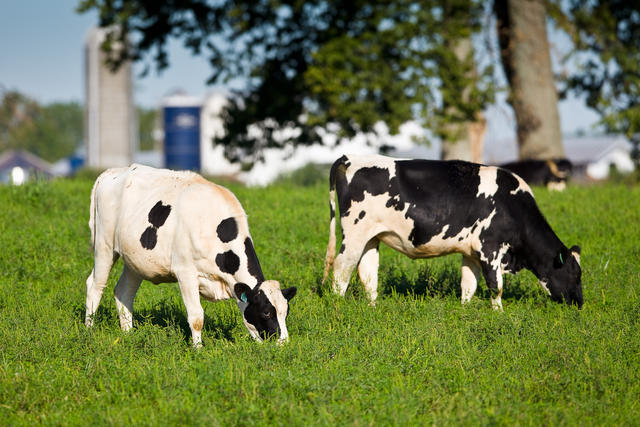UKAg collaborating with UT in $1.8 million grant to study organic dairy production
UKAg collaborating with UT in $1.8 million grant to study organic dairy production


Kentucky is home to nearly 30 organic dairies, and that number is expected to double in the next three to five years. Organic dairy producers have voiced frustration at the lack of research-based forage production information available. Recently, however, the University of Kentucky College of Agriculture, Food and Environment recently began a partnership with the University of Tennessee Institute of Agriculture to conduct research that may fill the gap and help organic dairies strengthen their profitability.
The U.S. Department of Agriculture awarded a $1.8 million grant to UT, and UK will subcontract nearly $500,000 of that amount to begin multidisciplinary research in the departments of Animal and Food Science, Agricultural Economics and Plant and Soil Sciences.
“The organic dairy industry is growing in our state, and we are excited to have this chance to do research that could boost their success,” said Ray Smith, UK forage specialist. “Kentucky organic dairy producers have some challenges finding a suitable forage combination that will work over an extended grazing season, and they have to be able to do it without using pesticides.”
Another challenge for organic dairy producers is finding a forage that will sustain a lactating cow.
“Lactating cows have high energy and protein requirements,” said Jeffrey Bewley, UK dairy specialist. “In organic dairy, these requirements are largely met through forages. Organic dairy cows also have different animal care needs that we need to understand better. ”
Economically speaking, the demand for organic dairy products is on the rise. The USDA Economic Research Service recently reported that national sales of organic dairy products have increased from $2.14 billion in 2005 to $5.071 billion in 2014
“The demand is there and represents an opportunity for dairy producers,” said Kenny Burdine, UK livestock marketing specialist. “Hopefully we’ll be able to figure out a way for organic dairies to efficiently produce more high-quality products and help producers who may be exploring the feasibility of transitioning to organic production.”
While the research is specifically targeted to identify forage combinations in pastures to benefit Southern organic dairy farmers, the benefits will reach beyond that.
“I think many of our results will be relevant to non-organic dairy systems as well,” Smith said. “Dairy producers who use pasture as part of their traditional dairy management system will likely see a benefit from these studies as well.”
The project will last four years. In addition to providing research-based information to organic dairy producers, the results will also contribute data to the Southeast Milk Quality Initiative study.
Agricultural Economics Research



